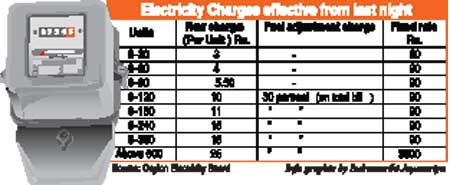
Concessions for some, burden for peopleThe Ceylon Electricity Board has been extending liberal concessionary terms for the past twenty years to a number of bodies whilst electricity consumers have been called upon to pay exorbitant rates from midnight yesterday. One such case is the Maradana Elephinstone Theatre which has been enjoying concessionary terms since 1987. A study of CEB figures obtained by The Sunday Times shows that for March 2006, this theatre utilized 16,180 kilowatts (or units) but paid a meagre Rs 61,100.84 when the actual cost due to the CEB is Rs 160,990.80. Thus, the loss to the CEB is Rs 99,889.96. If usage is calculated at yesterday’s new rate, the cost would amount to Rs 760,224. The Elphinstone still continues to enjoy lower rates.
Another of the many cases, The Sunday Times found, was the Tower Hall in Colombo. For the same period its usage amounted to 15,402 kilowatts (or units) but it paid the CEB only Rs 44,556.75. If it did not receive the concessionary terms since 1987, it would have been required to pay Rs 153,206. Whilst the loss to the CEB is Rs 108.650.16, the amount payable under the new rates would be Rs 723,813.60. These are just two of many instances where the CEB is continuing to lose vast amounts of money as a result of concessionary terms it has offered since 1987. Others to whom these concessions continue to be extended include Lionel Wendt Memorial Theatre, Young Women’s Christian Association (YWCA) and the Sugathadasa Stadium. CEB Chairman Udaya Kariyawasam told The Sunday Times that they hoped to collect Rs 43 billion every year through the latest price hike. But the price increase will affect several vital economic sectors. One such is the tourism sector which had, since 1994, enjoyed a concessionary tariff rate of two rupees per kilowatt or unit. However, the new rates will now be applicable to it. Srilal Miththapala, Vice President of the Hoteliers Association of Sri Lanka, said yesterday it would compel them to consider increasing their rates. “Most city hotels use a lot of air-conditioning, which is essential for the industry. We need it to provide comfort to our guests and it constitutes 65 per cent of the total electricity used,” he said. Mr. Mitthapala said it was grossly unfair for the industry to suffer due to bad management in electricity generation. Private hospitals also said they would be affected badly since rooms were air conditioned. Moreover, equipment such as CT, MRI scanners required electricity. Here again they say an increase in rates would inevitably be passed on to patients. |
|
||||||
|| Front
Page | News | Editorial | Columns | Sports | Plus | Financial
Times | International | Mirror | TV
Times | Funday
Times || |
| |
Reproduction of articles permitted when used without any alterations to contents and a link to the source page.
|
© Copyright
2008 | Wijeya
Newspapers Ltd.Colombo. Sri Lanka. All Rights Reserved. |
